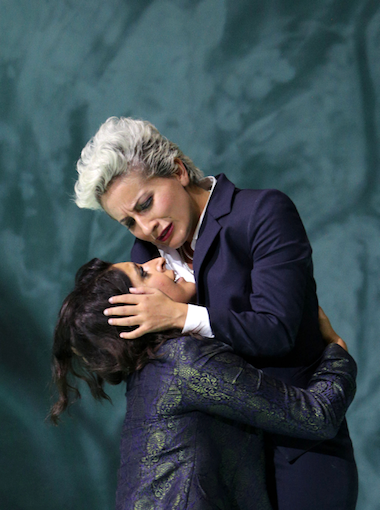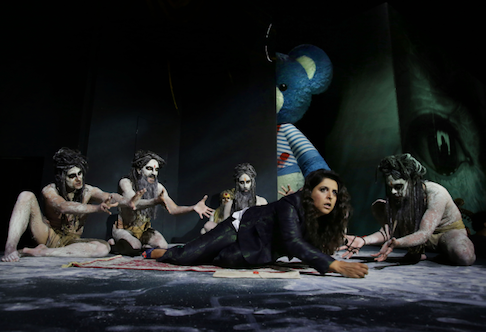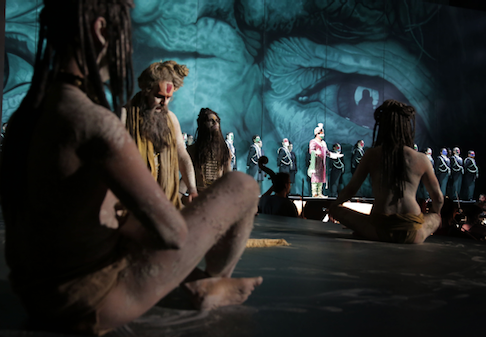
25 Aug 2019
Semiramide at the Rossini Opera Festival
The pleasures (immense) and pain of Gioachino Rossini’s Semiramide (Venice, 1823). Uncut.
English Touring Opera are delighted to announce a season of lyric monodramas to tour nationally from October to December. The season features music for solo singer and piano by Argento, Britten, Tippett and Shostakovich with a bold and inventive approach to making opera during social distancing.
This tenth of ten Live from London concerts was in fact a recorded live performance from California. It was no less enjoyable for that, and it was also uplifting to learn that this wasn’t in fact the ‘last’ LfL event that we will be able to enjoy, courtesy of VOCES8 and their fellow vocal ensembles (more below …).
Ever since Wigmore Hall announced their superb series of autumn concerts, all streamed live and available free of charge, I’d been looking forward to this song recital by Ian Bostridge and Imogen Cooper.
The Sixteen continues its exploration of Henry Purcell’s Welcome Songs for Charles II. As with Robert King’s pioneering Purcell series begun over thirty years ago for Hyperion, Harry Christophers is recording two Welcome Songs per disc.
Although Stile Antico’s programme article for their Live from London recital introduced their selection from the many treasures of the English Renaissance in the context of the theological debates and upheavals of the Tudor and Elizabethan years, their performance was more evocative of private chamber music than of public liturgy.
In February this year, Albanian soprano Ermonela Jaho made a highly lauded debut recital at Wigmore Hall - a concert which both celebrated Opera Rara’s 50th anniversary and honoured the career of the Italian soprano Rosina Storchio (1872-1945), the star of verismo who created the title roles in Leoncavallo’s La bohème and Zazà, Mascagni’s Lodoletta and Puccini’s Madama Butterfly.
Evidently, face masks don’t stifle appreciative “Bravo!”s. And, reducing audience numbers doesn’t lower the volume of such acclamations. For, the audience at Wigmore Hall gave soprano Elizabeth Llewellyn and pianist Simon Lepper a greatly deserved warm reception and hearty response following this lunchtime recital of late-Romantic song.
Collapsology. Or, perhaps we should use the French word ‘Collapsologie’ because this is a transdisciplinary idea pretty much advocated by a series of French theorists - and apparently, mostly French theorists. It in essence focuses on the imminent collapse of modern society and all its layers - a series of escalating crises on a global scale: environmental, economic, geopolitical, governmental; the list is extensive.
For this week’s Live from London vocal recital we moved from the home of VOCES8, St Anne and St Agnes in the City of London, to Kings Place, where The Sixteen - who have been associate artists at the venue for some time - presented a programme of music and words bound together by the theme of ‘reflection’.
'Such is your divine Disposation that both you excellently understand, and royally entertaine the Exercise of Musicke.’
Amongst an avalanche of new Mahler recordings appearing at the moment (Das Lied von der Erde seems to be the most favoured, with three) this 1991 Mahler Second from the 2nd Kassel MahlerFest is one of the more interesting releases.
‘And there was war in heaven: Michael and his angels fought against the dragon; and the dragon fought and his angels, And prevailed not; neither was their place found any more in heaven … that old serpent … Satan, which deceiveth the whole world: he was cast out into the earth, and his angels were cast out with him.’
If there is one myth, it seems believed by some people today, that probably needs shattering it is that post-war recordings or performances of Wagner operas were always of exceptional quality. This 1949 Hamburg Tristan und Isolde is one of those recordings - though quite who is to blame for its many problems takes quite some unearthing.
There was never any doubt that the fifth of the twelve Met Stars Live in Concert broadcasts was going to be a palpably intense and vivid event, as well as a musically stunning and theatrically enervating experience.
‘Love’ was the theme for this Live from London performance by Apollo5. Given the complexity and diversity of that human emotion, and Apollo5’s reputation for versatility and diverse repertoire, ranging from Renaissance choral music to jazz, from contemporary classical works to popular song, it was no surprise that their programme spanned 500 years and several musical styles.
The Academy of St Martin in the Fields have titled their autumn series of eight concerts - which are taking place at 5pm and 7.30pm on two Saturdays each month at their home venue in Trafalgar Square, and being filmed for streaming the following Thursday - ‘re:connect’.
The London Symphony Orchestra opened their Autumn 2020 season with a homage to Oliver Knussen, who died at the age of 66 in July 2018. The programme traced a national musical lineage through the twentieth century, from Britten to Knussen, on to Mark-Anthony Turnage, and entwining the LSO and Rattle too.
With the Live from London digital vocal festival entering the second half of the series, the festival’s host, VOCES8, returned to their home at St Annes and St Agnes in the City of London to present a sequence of ‘Choral Dances’ - vocal music inspired by dance, embracing diverse genres from the Renaissance madrigal to swing jazz.
Just a few unison string wriggles from the opening of Mozart’s overture to Le nozze di Figaro are enough to make any opera-lover perch on the edge of their seat, in excited anticipation of the drama in music to come, so there could be no other curtain-raiser for this Gala Concert at the Royal Opera House, the latest instalment from ‘their House’ to ‘our houses’.
"Before the ending of the day, creator of all things, we pray that, with your accustomed mercy, you may watch over us."

The pleasures (immense) and pain of Gioachino Rossini’s Semiramide (Venice, 1823). Uncut.
That’s four solid hours of music — six arias and four duets (plus an introduction and two finales). Rossini scholar Philip Gossett asserts that Rossini will have never heard this, his last tragedy, performed uncut. We owe the privilege of hearing every last note to the Rossini Opera Festival which is obviously obliged to perform the entirety of its critical editions.
It was a long evening, very long, and a surplus of pleasure, notably two splendid singers, Georgian soprano Salome Jicia as Semiramide and Armenian mezzo soprano Varduhi Abrahamyan. Both singers made big impressions in their Pesaro debuts, the 2016 La donna del lago, and they return now with even more confidence and fully mature techniques.
Adding to the evening’s glamour was Pesaro conductor Michele Mariotti, son of Gianfranco Mariotti founder of the Rossini Opera Festival. Though rarely on the podium at the Rossini Opera Festival, conductor Mariotti is often on the podiums of the world’s most prestigious opera houses and festivals. Mo. Mariotti brings impeccable taste to informed contemporary Rossini style, and a musical confidence that pervades every moment on the stage.
Unlike most Rossini operas Semiramide possesses an elaborate overture (double winds plus four horns and three trombones as well!) that is specific to its musical content. It unfolds in a sumptuous horn quartet duet with the two bassoons, it makes surprising effects with its piccolo solos and it well exploits Rossini’s love of playfully passing lines between the woodwinds. Mo. Mariotti’s overture deservedly earned one of the evening’s hugest ovations.
Semiramide is the shocking story of a queen who was an adulteress, a murderess and guilty of incest as well. Maybe back in 800 BC the story was historical fact, but nearly all subsequent Western civilizations have put their spin on its happenings, including Rossini’s librettist Gaetano Rossi who rendered it into the thirteen musical numbers that offer singers with spectacular techniques the chance to show-off.
 Varduhi Abrahamyan as Arsace, priests and partially hidden teddybear
Varduhi Abrahamyan as Arsace, priests and partially hidden teddybear
Just now in Pesaro stage director Graham Vick brought Rossini’s Semiramide into the twenty-first century playing heavily on contemporary sexual ambiguities, and teasing us with a huge, cartoon teddybear image to remind us that an innocent young child is mixed up in the story’s brutality. The entire four hours unfolded under or within the age-withered gaze of the man Semiramide murdered — her husband, the king Nino, the father of her son — and the reverse side of that huge image (the two stage wagons were turned around) where childish drawings were scribbled on the blank surfaces between the wagons’ structural supports.
The stage metaphor was of utmost simplicity, but reeked of theatrical complexity. We understood that Rossini’s musical language was transformed into a language of contemporary theater, and that it spoke to us not as a straightforward locale in which Rossini’s singers sing, but as the world we live in, where we feel and know but that we do not define.
Semiramide wore pants, high heels and a severe short haircut. She was a powerful woman who dominated men and their destinies. The young general Arsace wore a black pants suit with only a gold shoulder braid to indicate military rank, and with ample décolletage to boast a well endowed female breast. The sexual tension of forbidden desire rose to a nearly unbearable level as we watched and listened to these two young, powerful women negotiate their famed duet "Serbami ognor si fido il cor."
The high priest Oroe, bass Carlo Cigni, connects Graham Vick’s post modern world to a netherworld. He was some sort of high priest (guru) of a primitive culture having, supposedly, greater access to the earth’s truths. He had a number of similar undressed acolytes who made the fawning motions of clueless cult followers, mindlessness that echoed the innocence of the teddybear. Oroe’s dictums from the netherworld caused many, but hardly all of the problems.
Semiramide’s daughter Azema appeared in virginal white standing high at the side of the stage under a childish scribble of the sun. She was the contested prize (the prize includes becoming king of Assyria). She has little to sing in Semiramide’s ten arias and duets. The contenders for the throne are an Assyrian prince, Azzur, dressed like an early twentieth century Prussian prince, and an Indian king, Idreno, dressed as an exotic Indian king. Both of these men of course have a lot to sing about over then next few hours.
 Antonino Siragusa as Idremo, priest supernumeraries in foreground
Antonino Siragusa as Idremo, priest supernumeraries in foreground
Here’s the catch: Rossini and his librettist established a basic four part model for all of Semiramide’s arias and duets, beginning with a cantabile (melodic) section followed by a chorus and recitative that changes the situation. Then there is the cabaletta (a livelier reaction to the situation), and finally a repetition of the cabaletta wherein the singer shows his stuff (added ornamentation). This is a long, drawn out process (and there were ten of them) that at best allowed us to know each of the characters and to know its singer. And at worst to tire us beyond caring.
The matricide that ends the opera packed a wallop. We did indeed know Semiramide and her son Ninia who had become the general Arsace. Even knowing Semiramide’s nefarious actions we still did care about this tragic queen, and we did feel the complexity of emotion that gripped Arsace in murdering his mother. The tragic irony that made him Assyria’s king hung heavily.
Far more than staging an evening of brilliant singing director Graham Vick created an event of monumental tragedy. It was effected by the brilliant singing and acting of Salome Jicia as Semiramide and Varduhi Abrahamyan as Arsace. Rossini’s melodramma tragico was in fact a quite successful sung tragedy.
The splendid cast included the Azzur of Argentine baritone Nahuel di Pierro and the Idreno of tenorino Antonino Siragusa as the rivals for the hand of Semiramide’s daughter Azema sung by Romanian mezzo-soprano Martiniana Antonie. Bass Carlo Cigni sang the high priest Oroe and Russian bass Sergey Artamonov sang the two brief interruptions of the ghost of the murdered king Nino. The captain of the royal guard, Mitrane, was sung by Alessandro Luciano.
Mr. Vick's associates in creating this production were his long time collaborators Stuart Nunn (sets and costumes) and Giuseppe di Iorio (lighting).
The performances took place in the Vitrifrigo Arena (Vitrifrigo is a Pesaro company that makes miniature refrigerators and freezers), formerly the Adriatic Arena. I attended the third of four performances on August 20, 2019.
Michael Milenski